

Energy
No link between wind farms and health problems, study finds
Australia’s leading medical research body has found that there is no credible evidence to suggest that wind farms are harmful to human health.
The National Health and Medical Research Council (NHMRC) released a draft information paper on Monday that concludes, “There is no reliable or consistent evidence that wind farms directly cause adverse health effects in humans.”
Beginning in 2012, NHMRC researchers analysed 2,850 published references and more than 500 public submissions regarding noise pollution, “shadow flicker” and electromagnetic radiation caused by wind farms.
The researchers ultimately found no conclusive evidence of any health consequences from these sources.
They said that it is unlikely that noises from wind farms could be heard at distances of more than 500 metres to 1,500 metres away. Even when they can be heard, the paper suggests they are no different from other natural or manmade noises in terms of their impact.
They also found no evidence to support the suggestion that the shadow flicker caused by turbines can trigger epilepsy, and found that turbines generated no more radiation than the typical Australian home.
Quoting the paper, NHMRC chief executive Warwick Anderson said, “There is some consistent but poor quality evidence that proximity to wind farms is associated with annoyance and, less consistently, with sleep disturbance and poorer quality of life.
“However, it is unknown whether these effects are caused by the wind turbines themselves, or by other related factors.”
Prof Bruce Armstrong, chair of the NHMRC’s expert reference group on wind farms and health, explained that it was hard to establish what might be the cause of this annoyance.
“It is not necessarily noise, it could be the visual impact of the wind farms that causes the annoyance. And then the annoyance may in fact cause people to not be able to sleep,” he said.
NHMRC have said it will give the public 45 days to respond to the report and submit any additional evidence, and will finalise the study a month later.
Though the council’s researchers suggest further investigation is needed, this latest effort becomes the 20th review of the health impacts of wind turbines since 2003. All of them have come to the same conclusion.
Despite this, the Australian government says that it will continue to ask for more research, after pledging to do so when campaigning for election.
Environmental campaigners have condemned this approach.
“These findings are consistent with previous research, so should be of no surprise to anyone”, said Leigh Ewbank, Friends of the Earth Australia’s renewable energy spokesperson.
“If the Abbott government pursues another study it will confirm it puts ideology ahead of good policy.”
Further reading:
Wind farms an ‘attractive long-term’ investment opportunity
Wind power saves Ireland €1bn in fossil fuel imports over five years
UK wind power ends 2013 on record-breaking high
Wind farm syndrome: it’s all in the mind
Delingpole wind article criticised by Australian Press Council


 Environment12 months ago
Environment12 months agoAre Polymer Banknotes: an Eco-Friendly Trend or a Groundswell?

 Features11 months ago
Features11 months agoEco-Friendly Cryptocurrencies: Sustainable Investment Choices

 Energy11 months ago
Energy11 months agoThe Growing Role of Solar Panels in Ireland’s Energy Future

 Energy12 months ago
Energy12 months agoHow Renewable Energy Can Help Combat Climate Change, According to Indra Energy




























